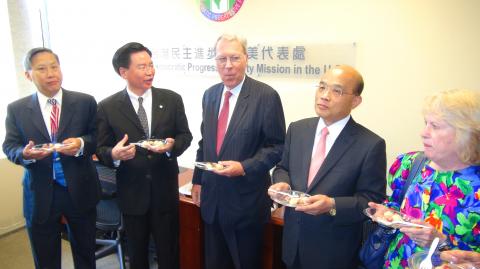Democratic Progressive Party (DPP) Chairman Su Tseng-chang (蘇貞昌) formally opened the party’s new offices in Washington on Friday and said that his visit to the US had been “smooth and successful.”
He said he had been able to explain DPP goals and ambitions to members of the administration of US President Barack Obama, to members of the US Congress and to leading think tank academics.
“They seemed to be happy and satisfied with us,” Su said.

Photo: CNA
“Everything we have heard has been very positive and the DPP’s image has been successfully rebranded,” DPP Representative to the US Joseph Wu (吳釗燮) said.
“We wanted our friends in the US to understand the DPP and I think we have accomplished that,” Su said.
Su spent three busy days in the US capital, making speeches, meeting officials and socializing with members of the Taiwanese-American community.
One of the highlights came on Friday morning, when he officially opened the party offices in a fashionable new building a few minutes’ walk from the White House.
He said the DPP’s mission in Washington was small, but that it was a “good start.”
Su said that the DPP party offices would not compete with the government’s Taipei Economic and Cultural Representative Office (TECRO) in the US. Instead, together with TECRO, the DPP mission would be able to give the US a more complete picture of Taiwan, he said.
He said that if there was some issue that TECRO did not explain well or clearly, the DPP mission would try to give the views of Taiwanese.
“We are setting up this office to have a fixed location so that our friends in the US can find the DPP anytime,” he said.
“We have big ambitions and we want to make sure the US administration understands the DPP and Taiwan,” Su said. “This will help us to return to power in 2016.”
Su said that for reasons of confidentiality, he could not give details of all his discussions in Washington or identify everyone he met, but that his talks had been “frank.”
During a press conference held in the new offices, Su said that while the party could be flexible in addressing “all kinds of issues,” it would never change its position on the sovereignty and independence of Taiwan.
He said that the KMT often said one thing, then did another.
“Sometimes in Taiwan they say one thing, but when they go to China, they seem to say something else,” Su said.
The DPP was very clear on sovereignty and had never been ambiguous on the issue, he said. That was the biggest difference between the two parties, he said. Su said that under the DPP, Taiwan would never collude with China over disputed territories in the East China Sea or the South China Sea.
Taiwan’s weapons are for the defense of the nation and would be used only against attacking forces, he said.
He said China was a rising power and he understood that it wanted to interact with the US.
“However, the US stands by its values and ideals and it stands by its promises to friends,” he said.
“We trust the US and we share these values and we are good partners not because of size, but because of common values,” Su said. “I have received very clear signals from the administration here that the US will not give up on friends.”
“Even though the US makes new friends, it will not give up on old friends,” Su said.

Japanese footwear brand Onitsuka Tiger today issued a public apology and said it has suspended an employee amid allegations that the staff member discriminated against a Vietnamese customer at its Taipei 101 store. Posting on the social media platform Threads yesterday, a user said that an employee at the store said that “those shoes are very expensive” when her friend, who is a migrant worker from Vietnam, asked for assistance. The employee then ignored her until she asked again, to which she replied: "We don't have a size 37." The post had amassed nearly 26,000 likes and 916 comments as of this

US President Donald Trump said "it’s up to" Chinese President Xi Jinping (習近平) what China does on Taiwan, but that he would be "very unhappy" with a change in the "status quo," the New York Times said in an interview published yesterday. Xi "considers it to be a part of China, and that’s up to him what he’s going to be doing," Trump told the newspaper on Wednesday. "But I’ve expressed to him that I would be very unhappy if he did that, and I don’t think he’ll do that," he added. "I hope he doesn’t do that." Trump made the comments in

Tourism in Kenting fell to a historic low for the second consecutive year last year, impacting hotels and other local businesses that rely on a steady stream of domestic tourists, the latest data showed. A total of 2.139 million tourists visited Kenting last year, down slightly from 2.14 million in 2024, the data showed. The number of tourists who visited the national park on the Hengchun Peninsula peaked in 2015 at 8.37 million people. That number has been below 2.2 million for two years, although there was a spike in October last year due to multiple long weekends. The occupancy rate for hotels

A cold surge advisory was today issued for 18 cities and counties across Taiwan, with temperatures of below 10°C forecast during the day and into tonight, the Central Weather Administration (CWA) said. New Taipei City, Taipei, Taoyuan and Hsinchu, Miaoli and Yilan counties are expected to experience sustained temperatures of 10°C or lower, the CWA said. Temperatures are likely to temporarily drop below 10°C in most other areas, except Taitung, Pingtung, Penghu and Lienchiang (Matsu) counties, CWA data showed. The cold weather is being caused by a strong continental cold air mass, combined with radiative cooling, a process in which heat escapes from